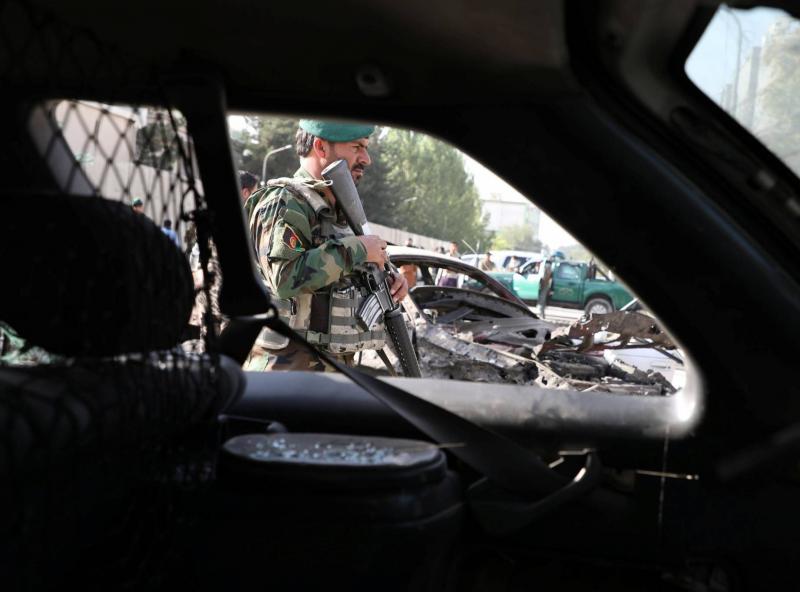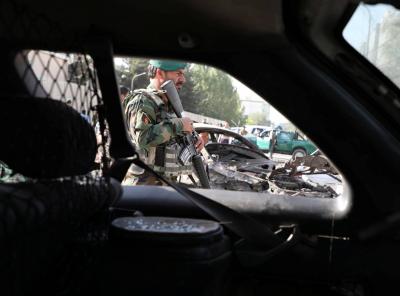The Deputy Governor of Aybak, the capital of Samangan Province in northern Afghanistan, confirmed on Monday that the city has fallen to the Taliban, noting that Afghan forces withdrew from the city without a fight. The Taliban announced its control over the city, making it the sixth provincial capital to fall into its hands. Zabihullah Mujahid, the spokesman for the movement, released a video of Taliban fighters at the borders of Aybak.
This comes as the Afghan Ministry of Interior announced on Monday the beginning of an operation to regain control over the capital of Takhar Province and reclaim certain areas from the Taliban. The Afghan Ministry of Defense stated that the army is engaged in military operations against the Taliban in 14 provinces, noting that 579 Taliban fighters were killed in the past 24 hours. Meanwhile, the Afghan Vice President announced his displacement to the capital Kabul due to Taliban crimes, urging the United Nations and international organizations to assist those displaced to Kabul.
The Taliban stated that U.S. airstrikes targeted its positions in Lashkar Gah, the capital of Helmand.
**The Fall of One Capital After Another**
The Taliban now controls 6 of Afghanistan's 34 provincial capitals after seizing three of them the previous day, including the city of Kunduz, in a large-scale attack that seems beyond the army's ability to stop. Taliban fighters opened the prison gates in Takhar after taking control of the area, releasing all inmates. The Taliban typically targets prisons to free incarcerated fighters and thus bolster its ranks.
The Taliban has seized several local capitals in northern Afghanistan, while the army announced military operations to regain control of what they have lost in recent days.
**Intense Battles and Urban Warfare**
Following fierce battles and street fighting between the army and Taliban fighters, cities and local capitals in northern Afghanistan have come under the movement's influence. Villages in the north of the country have seen weeks-long battles until the militants successfully stormed major cities, asserting control over all their facets. The most notable cities now under Taliban control in the north are Kunduz, Talqan, Sar-e Pol, and several other cities near the country's northern border.
Following the rapid advance of Taliban fighters in recent hours, the army announced the launch of extensive military operations to reclaim Taliban-held cities in the north, despite losing territory.
Marwais Stanikzai, a spokesman for the Ministry of Interior, stated that security reinforcements, including special forces, have been deployed in Sar-e Pol, Jozjan, Baghlan, and other classified dangerous provinces, asserting: "These cities that the Taliban intends to seize will become their graves."
**Taliban Influence Expands**
As battles occur between militants and security forces, the geographical area under Taliban influence expands hour by hour. Kunduz represents the most significant gain for the Taliban since launching its offensive in May coinciding with the final phase of foreign troop withdrawals from the country. The city has long been a target for the Taliban, which saw its fighters invade in 2015 and again in 2016, though they never managed to maintain control for long.
Kabul's capability to maintain control over the north is crucial for the longevity of the government.
**The Importance of the North**
Northern Afghanistan has long been regarded as an anti-Taliban stronghold that witnessed the fiercest resistance to the movement's rule in the 1990s. The region still harbors numerous militias and is fertile ground for recruiting armed forces. Foreign troops are scheduled to complete their withdrawal by the end of this month, ahead of the 20th anniversary of the September 11 attacks in the United States, which led to the invasion that ousted the Taliban.
Former U.S. Ambassador to Kabul stated on Sunday that a lengthy civil war in Afghanistan is more likely than a swift Taliban takeover as the military withdrawal from the country nears completion.




